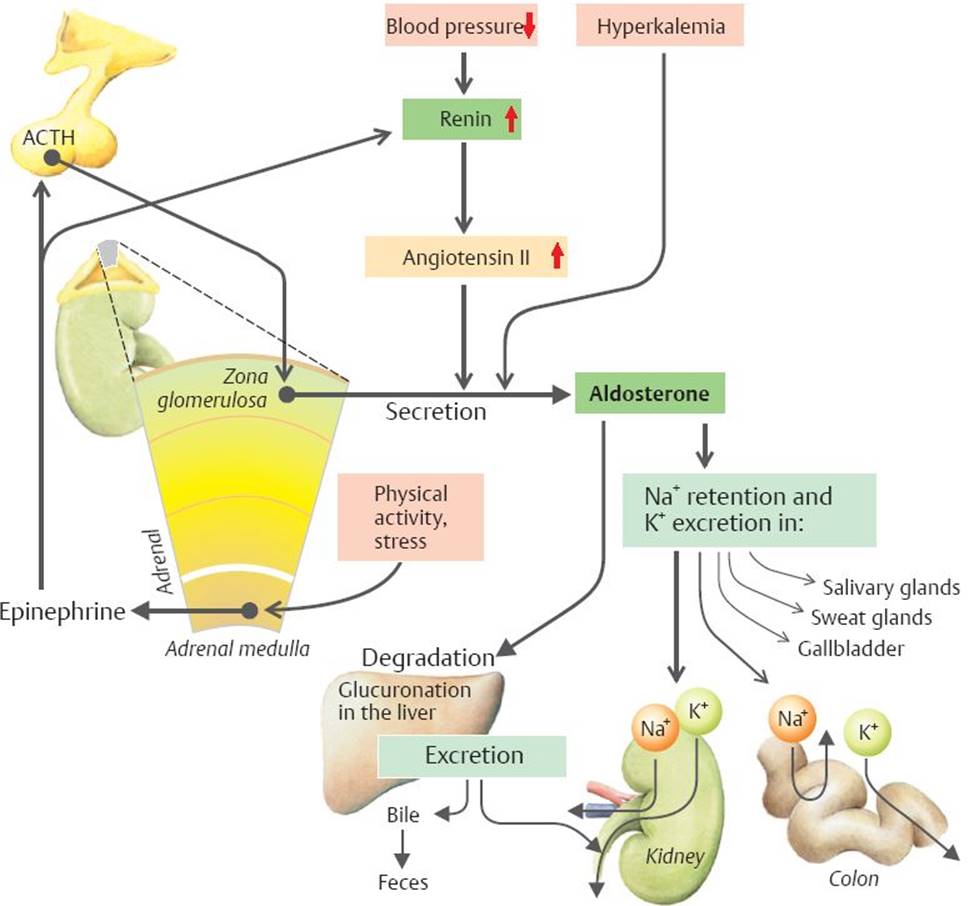Makindo Medical Notes.com |
|
|---|---|
| Download all this content in the Apps now Android App and Apple iPhone/Pad App | |
| MEDICAL DISCLAIMER:The contents are under continuing development and improvements and despite all efforts may contain errors of omission or fact. This is not to be used for the assessment, diagnosis or management of patients. It should not be regarded as medical advice by healthcare workers or laypeople. It is for educational purposes only. Please adhere to your local protocols. Use the BNF for drug information. If you are unwell please seek urgent healthcare advice. If you do not accept this then please do not use the website. Makindo Ltd | |
Adrenal Physiology
-
| About | Anaesthetics and Critical Care | Anatomy | Biochemistry | Cardiology | Clinical Cases | CompSci | Crib | Dermatology | Differentials | Drugs | ENT | Electrocardiogram | Embryology | Emergency Medicine | Endocrinology | Ethics | Foundation Doctors | Gastroenterology | General Information | General Practice | Genetics | Geriatric Medicine | Guidelines | Haematology | Hepatology | Immunology | Infectious Diseases | Infographic | Investigations | Lists | Microbiology | Miscellaneous | Nephrology | Neuroanatomy | Neurology | Nutrition | OSCE | Obstetrics Gynaecology | Oncology | Ophthalmology | Oral Medicine and Dentistry | Paediatrics | Palliative | Pathology | Pharmacology | Physiology | Procedures | Psychiatry | Radiology | Respiratory | Resuscitation | Rheumatology | Statistics and Research | Stroke | Surgery | Toxicology | Trauma and Orthopaedics | Twitter | Urology
Related Subjects: |Adrenal Physiology |Addisons Disease |Phaeochromocytoma |Adrenal Adenomas |Adrenal Cancer |Cushing Syndrome |Cushing Disease |Congenital Adrenal hyperplasia |Primary hyperaldosteronism (Conn's syndrome) |ACTH |McCune Albright syndrome
Overview of Adrenal Physiology
The adrenal glands are endocrine glands located on top of each kidney. They are responsible for producing a variety of hormones that regulate metabolism, immune response, blood pressure, and stress response.
Key Concepts
- Anatomy of the Adrenal Glands:
- Each adrenal gland is composed of two main parts:
- Adrenal Cortex: The outer layer, responsible for producing steroid hormones.
- Adrenal Medulla: The inner layer, responsible for producing catecholamines.
- Each adrenal gland is composed of two main parts:
- Adrenal Cortex:
- Divided into three zones, each producing different hormones:
- Zona Glomerulosa: Produces mineralocorticoids (e.g., aldosterone).
- Zona Fasciculata: Produces glucocorticoids (e.g., cortisol).
- Zona Reticularis: Produces androgens (e.g., dehydroepiandrosterone, DHEA).
- Divided into three zones, each producing different hormones:
- Adrenal Medulla:
- Produces catecholamines:
- Adrenaline (Epinephrine)
- Noradrenaline (Norepinephrine)
- Produces catecholamines:
Hormones of the Adrenal Cortex
- Mineralocorticoids:
- Aldosterone:
- Regulates sodium and potassium balance.
- Increases sodium reabsorption and potassium excretion in the kidneys.
- Helps control blood pressure and blood volume.
- Aldosterone:
- Glucocorticoids:
- Cortisol:
- Regulates metabolism of carbohydrates, proteins, and fats.
- Has anti-inflammatory and immunosuppressive effects.
- Helps the body respond to stress by increasing blood sugar levels and enhancing the brain's use of glucose.
- Cortisol:
- Androgens:
- Dehydroepiandrosterone (DHEA):
- Precursor to male and female sex hormones (testosterone and estrogen).
- Contributes to secondary sexual characteristics and reproductive function.
- Dehydroepiandrosterone (DHEA):
Hormones of the Adrenal Medulla
- Catecholamines:
- Adrenaline (Epinephrine):
- Increases heart rate and blood pressure.
- Increases blood flow to muscles and brain.
- Increases blood sugar levels by promoting glycogenolysis and gluconeogenesis.
- Prepares the body for "fight or flight" response.
- Noradrenaline (Norepinephrine):
- Works alongside adrenaline in response to stress.
- Constrains blood vessels, increasing blood pressure.
- Adrenaline (Epinephrine):
Regulation of Adrenal Hormone Secretion
- Adrenocorticotropic Hormone (ACTH):
- Produced by the pituitary gland.
- Stimulates the adrenal cortex to secrete cortisol and androgens.
- Release is regulated by the hypothalamus via corticotropin-releasing hormone (CRH).
- Renin-Angiotensin-Aldosterone System (RAAS):
- Regulates aldosterone secretion.
- Activated by low blood pressure or low sodium levels.
- Renin (from kidneys) converts angiotensinogen to angiotensin I, which is then converted to angiotensin II, stimulating aldosterone release.
- Sympathetic Nervous System:
- Stimulates the adrenal medulla to release catecholamines during stress.
Clinical Relevance
- Adrenal Insufficiency (Addison's Disease):
- Caused by inadequate production of adrenal hormones.
- Symptoms include fatigue, muscle weakness, weight loss, low blood pressure, and hyperpigmentation.
- Treated with hormone replacement therapy.
- Cushing's Syndrome:
- Caused by excess cortisol production.
- Symptoms include weight gain, moon face, high blood pressure, and high blood sugar.
- May result from long-term use of corticosteroid medications or adrenal tumours.
- Hyperaldosteronism:
- Excess production of aldosterone.
- Leads to high blood pressure and low potassium levels.
- May be caused by adrenal hyperplasia or tumours.
- Pheochromocytoma:
- Rare tumour of the adrenal medulla.
- Causes excess production of catecholamines.
- Symptoms include hypertension, palpitations, sweating, and headaches.
- Treated with surgery and medication to control blood pressure.
Summary
Adrenal physiology encompasses the functions of the adrenal cortex and medulla, which produce a variety of hormones essential for maintaining homeostasis, responding to stress, and regulating metabolism, blood pressure, and immune response. Understanding adrenal physiology is crucial for diagnosing and treating disorders related to hormone imbalances.
